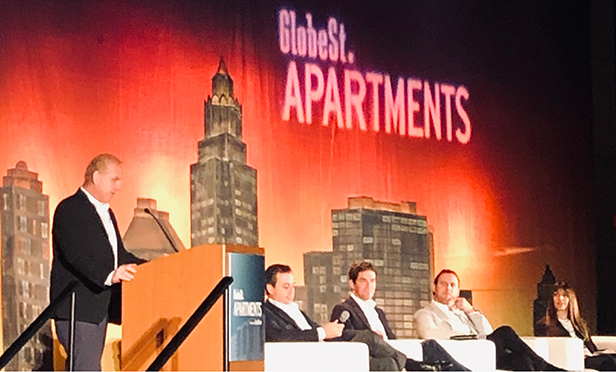 LOS ANGELES—The opportunity still remains strong in the development and redevelopment of properties. So said moderator Mike Rovner, president of Mike Rovner Construction Inc., during Wednesday morning's opening panel session at this year's GlobeSt. APARTMENTS 2019 event.
LOS ANGELES—The opportunity still remains strong in the development and redevelopment of properties. So said moderator Mike Rovner, president of Mike Rovner Construction Inc., during Wednesday morning's opening panel session at this year's GlobeSt. APARTMENTS 2019 event.
Rovner did, however, point out that the limited availability of developable land sites, rising construction cost and finding renovation properties that make financial sense to invest and develop are just a few of the challenges investors and developers encounter.
When asked about whether or not investors are shying away from new investment opportunities, panelist Brett Betzler, partner of Moran & Co., said that investors are starting to realize that they cannot predict what will happen with the economy. "While I did sense some hesitation with developers a few years back, I am not sensing that today," he said.
According to Betzler, "people want to do business and are pursuing development opportunities." He added that people are also realizing that we may or may not have a recession in the near term, but "the market is still strong."
Ryan Wagner, EVP of capital markets of multifamily at Colliers International, agreed, noting that at least the mentality in the lending space is that the down cycle hasn't come but said that you do need to be selective, especially when you are talking about top of the market rents.
For Colliers, Wagner said the firm has tried to focus on infill deals and in particular, have paid attention to the equity coming into the transaction. "We are more interested in doing deals with developers who are being smart about their leverage who maybe has 10-plus year money in case a recession does hit… We need to be able to push through with the right partners."
Panelist Laurie Lustig-Bower, EVP of investment properties in the multihousing group at CBRE, touched on the housing shortage in CA, noting that even if we go into a recession, we still have an imbalance in supply and demand. "I don't think any recession will be like what we saw in 2008 and 2009. It will be more mild… The people I talk to aren't predicting a big drop in rents."
RISING CONSTRUCTION COSTS
When asked about what developers are doing today to make ground up projects make economic sense given rising construction costs, Lustig-Bower said that it is much harder to pencil out because rents haven't kept up with the rising construction costs.
She noted that if a project falls into a transit oriented area, it can help to build less parking, but unless you are on top of a rail station, most people still need a car. Another thing she has seen is a big push to design buildings now where you aren't going subterranean with your parking because the cost on that has gone up tremendously.
Another thing developers are looking into is modular construction, she continued. "They are finding that it saves time in building, which will ultimately cut costs." Another developer Lustig-Bower spoke with said that when they are buying modular buildings, they are buying the basic package which saves on the construction costs. Then, she said, they don't have to underwrite as high a rent because they aren't offering the big finishes.
"Another thing they are doing is smaller units so the price per square foot is still high but the amount the tenant is paying isn't egregious."
Betzler added that the other thing they are doing is just not building. "We have a housing crisis because even if we could build as many units as we want, we have limited resources for construction. Costs have just gone through the roof so some projects are just not going forward particularly if you have a high rise type 1 high rise projects. In San Francisco, for example, the rents would need to be over $7 a foot."
WHAT DOES VALUE-ADD LOOK LIKE?
When new development might not pencil, many are looking at getting creative. There are many new co-living things happening, for example, such as renting blocks of apartments and operating them as hotels within apartments, said Betzler. "You will start to see traditional apartment development change over time."
Lustig-Bower added that "community is the latest new amenity." Many are looking to add value add by partnering with the community such as looking for things like comedy night or areas for people to practice music, she said. "People are adding concierge type services that almost have a hospitality twist to it."
Other things they are adding includes things that make life easier for the tenants, said panelists. "They are thinking outside the box like with grab and go food in a kiosk in the lobby or partnering with delivery services for tenants to have in room dining."
For those tenants who are experimenting with not having a car, many, aside from having areas to wait for Lyft or Uber rides, are looking to also partnering with rental car companies to offer cheaper rental services, added Lustig-Bower. "It is about bring creative and giving you things, as the tenant, that make you feel like you are in a sense of a community. It really is changing the way a renter expects to live."
Keep checking back with GlobeSt.com for more from the GlobeSt. APARTMENTS event and take a look at the below stories on the topic as well.
Good Investment Opportunity in Class-A New Builds
Greg Brown: Rent Control Is A Failed Policy
© 2025 ALM Global, LLC, All Rights Reserved. Request academic re-use from www.copyright.com. All other uses, submit a request to [email protected]. For more information visit Asset & Logo Licensing.








